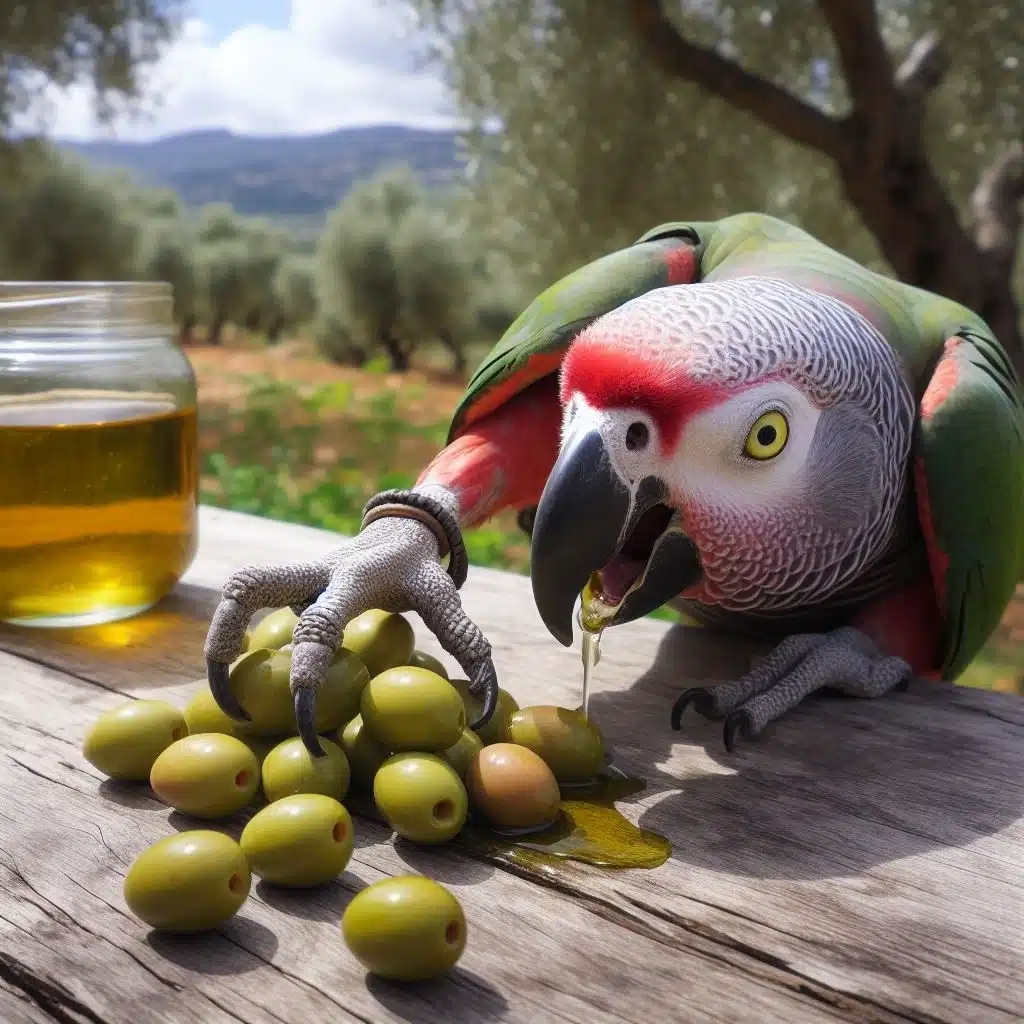Olives belong to a group of fruits called drupes or stone fruits, they are related to peaches, mangoes, pistachios, almonds, and cherries. They are a perfect addition to salads, and sandwiches and can even be a delicious topping on pizza. However, if you’re on this page I’m going to guess you’re here to find out whether or not they’re safe for your parrot to have. Let’s find out.

Can parrots eat olives? Parrots shouldn’t eat olives regularly due to their high fat and sodium content. There are no immediate toxins found in olives that are going to be life-threatening to your pet but olives don’t win any awards with the nutritional values. However, they do have some benefits like vitamin E, iron, and calcium.
In this article I’m going to explain further why olives aren’t the best snack to feed your parrot, can they have olive oil, and some other things you should be aware of as a parrot parent.
Why Are Olives Bad For Parrots?
Olives are very high in sodium due to them being packaged in brine or saltwater. This is the first warning sign for us parrot owners.
Too much sodium will upset your bird’s fluid balance leading to polydipsia and polyuria. These two conditions come together and happen when parrots get to thirty because they need to wash the sodium out of their system.
Increased sodium can also lead to :
- High blood pressure
- Heart disease
- Increased risk of cancer
What Are Some Benefits Of Olives?
It’s not all doom and gloom. Olives have some important vitamins and minerals that come with some health benefits.
Vitamin E
Olives contain vitamin E, a nutrient that plays a role in helping your parrot’s skin, brain, blood, and vision. These things work together and make your parrot appear younger due to their anti-aging effects.
Vitamin E is also important for immune system function and preventing the heart from clotting.
Antioxidants
Antioxidants are apparent in olives, these are molecules in your parrot’s body that fight free radicals. These substances are unstable atoms that cause your parrot harm by attacking the cells and causing things like cancer and heart disease.
Antioxidants work to neutralize them and are necessary for helping your parrot live a longer happier life.
Iron
The mineral in your parrot body responsible for making red blood cells, iron is in charge of an array of things that go on inside your parrot like :
- Improved energy and focus
- Helps the immune system function properly
- Regulates body temperature
Dark green leafy vegetables like kale, spinach broccoli, and dried fruit are also great sources of iron and safe to feed to your parrot.
Calcium
Did you know calcium plays a role in around 400 bodily functions for your parrot? Now imagine how they’d be affected if they weren’t getting enough calcium in their diet. 90% of calcium is found in your bird’s skeletal system, it comes as no surprise that calcium plays a role in the maintenance of the skeletal structure.
Other functions calcium is important for include :
- Blood clotting
- Egg formation (97% of eggshells are made of calcium)
- Fat metabolism
- Muscle development and movement
- Nerve transmission
Almonds, figs, edamame, kale, sweet potatoes, and butternut squash are all other safe alternatives to olives that contain calcium your parrot can benefit from.
Improved Heart Health
High cholesterol and high blood pressure are some of the main causes of cardiovascular problems. The main fatty acid inside olives, oleic acid is known for its ability to increase heart health.
This is due to it regulating cholesterol and preventing bad cholesterol from oxidizing.
Can Parrots Have Olive Oil?
The sodium that we don’t want parrots to ingest from regular olives isn’t as present in olive oil, making it much safer for our feathered friends.
With the sodium being taken out of the question olive oil has some beneficial properties your bird can benefit from. Let’s look into them.
Vitamins: Vitamins E and K are in olive oil, two vitamins important for boosting the immune system, blood clotting to prevent parrots from bleeding excessively, and protecting their bones and eye health.
Healthy Fats: Olive oil is abundant in healthy fats, yes not all fat is bad. These healthy fats have anti-inflammatory effects and may even reduce the risk of cancer
Antioxidants: The antioxidants in olive oil are great at fighting inflammation in your parrot’s body to prevent age-related illnesses. They also work to prevent your bird’s blood cholesterol from oxidizing. Both of these things work to prevent heart disease.
However olive oil isn’t perfect, it may contain some healthy fats but it’s also high in fats that your parrot can gain no benefit from. It’s also full of calories which can lead to obesity and unwanted weight gain that can lead to further problems if you don’t keep an eye out.
You should monitor the amount of olive oil you feed to your parrot as too much will reverse the health advantages it can bring.
Better Alternatives You Can Feed Your Parrot
Capers: Very similar to olives as they are even grown in the same region, with their appearance being green and round also. Capers are also full of vitamins A and E.
Olives For Parrots – Final Thoughts
Olives aren’t the best food to be given to your precious little pet, in reality, they aren’t missing much anyway. There are so many more nutrient-dense foods out there like capers or artichokes that are similar enough to olives except they don’t come with a downside.
As bad as olives are, olive oil is safe enough to feed to your parrot in moderation as it doesn’t come with the same sodium contents that olives too. However olive oil is full of fats so be sure to monitor how much you give.






